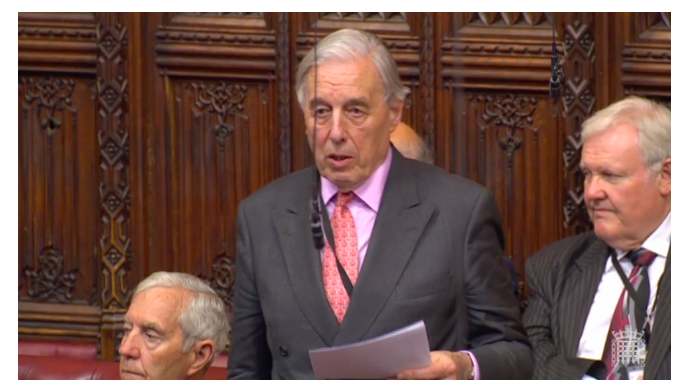12 May 2016
The last Immigration Bill debate took place on 10 May 2016, during which Lord Ramsbotham, Baroness Hamwee and Baroness Lister made impassioned speeches in their attempts to safeguard rights and dignity of people trapped in immigration detention.
We created a small Storify that captures this debate and the previous night’s debate at the House of Commons, which you can see here.
Below, we reproduce Lord Ramsbotham’s speech. You can read the transcript of the debate here. After this speech, Lord Ramsbotham withdrew his Amendment 84, by saying ‘With a heavy heart, I beg leave to withdraw the amendment.’.
==========================================================
‘My Lords, I am very grateful to the Minister for the care with which he has set out the Government’s case. I have often thought that the worst experience in life is to be associated with something that you know to be fundamentally wrong, but feel unable to prevent. I am experiencing that today, because, to our collective shame, this House could be about to sanction something that, as a nation, we have roundly condemned, and indeed fought against, when practiced by others over the years—namely, the arbitrary detention of innocent people by administrative diktat, rather than the due process of the rule of law.
During the passage of this dreadful Bill, with more than 400 government amendments suggesting that it had not been thought through before it was introduced, the House has twice voted to uphold the recommendation of a committee of the All-Party Group on Refugees and Migration, of which I and the noble Baronesses, Lady Hamwee and Lady Lister of Burtersett, were privileged to be members. The committee recommended that administrative detention, ordered by Home Office civil servants, should be limited to 28 days, after which the Home Secretary should be required, by law, to seek the approval of the First-tier Tribunal for any extension. Last night the Minister in the other place spectacularly missed that point when alleging that to specify a maximum time for immigration detention would be arbitrary, would not take account of individual circumstances, and would have a negative effect on the Government’s ability to enforce immigration controls and maintain public safety by encouraging individuals to seek to frustrate the removals process until this time limit was reached.
During the past 19 years I have had frequent cause to express my concern about the appallingly low standard of casework and procedural oversight in our immigration system. This began when, as Chief Inspector of Prisons, I found over 20 people from Bradford, who had been in this country for over 20 years—many of them married and with businesses of their own—who had been arrested and transported to Birmingham prison where, not surprisingly because they had not been charged with any offence, they went on hunger strike against the wholly inappropriate prison regime. Their right to remain in this country had not been processed by the Home Office—which is true today of more than 631,000 others—whose officials saw them as easy pickings for meeting performance indicators. I immediately complained to the Minister responsible, and was asked to take on the inspection of all immigration detention centres for my pains. This included inspecting Campsfield House after a riot, where I found that immigration centre rules were also wholly inappropriate, being based on prison rather than detention rules. My inspectorate and I set about revising them, inviting Home Office officials to work with us, the outcome being the immigration detention rules often quoted in debate on this Bill.
Since retiring as chief inspector, I have been a member of the Independent Asylum Commission, chaired an inquiry into the unlawful killing of an Angolan by G4S guards during an enforced removal, delivered a dossier on deaths and injuries inflicted on others being returned, forwarded reports on the inefficiency of the complaints system to the Home Secretary and lost count of the number of critical reports by inspectors of immigration and prisons that I have read. In other words, my 19-year experience of the immigration system entirely endorses the view of its then titular head, the noble Lord, Lord Reid, who, when Home Secretary, described it as not fit for purpose. Indeed, these experiences have encouraged me to believe that only root-and-branch surgery will enable the system to have any hope of coping with today’s requirements, let alone tomorrow’s, which will be exacerbated not just by civil wars in the Middle East but by other population movements and the effects of climate change.
I must admit that I was somewhat surprised last week when my noble and learned friend Lord Brown of Eaton-under-Heywood and my noble friend Lord Pannick focused on the periphery of theoretical access to the bail system rather than the fundamental obscenity of administrative detention. Their intervention reminded me that, over the years, successive Ministers have preferred to listen to fudge presented to them by their officials rather than facts immediately apparent to anyone who, like me, has had cause to examine them in detail. As has been reported time and again, conditions in our immigration removal centres are not good for a whole variety of reasons, not least lack of Home Office oversight. Four months is far too long for anyone to be condemned to remain in such conditions, certainly when it seems to be primarily for the convenience of incompetent officials and is not sanctioned by a court of law.
I do not pretend that casework is easy—indeed, one former head of the UK Border Agency decreed that only graduates were to do it—but its present standard, judging by the number of successful appeals against it, is appalling. I am not surprised that first the noble Lord, Lord Bates, and then the noble and learned Lord, Lord Keen, should have announced new arrangements, although I must admit that, having heard similar promises many times in the past 19 years, I will only believe them when I see them.
I now feel squeezed. Not only is time running out before Parliament is prorogued but I fear that, on the evidence of the amendment not being pressed to a vote in the other place last night, should noble Lords support my appeal to put pride in the reputation of our great nation before party political considerations and vote for what in their hearts they know to be right—namely, that administrative detention of anyone, anywhere, is fundamentally wrong—it may not succeed. I am conscious that it is easy for an independent Cross-Bencher to speak like that, but I am conscious, too, of the constitutional position of this House, which I do not want to put at risk.
The immigration system in this country is so dysfunctional that even the Home Office’s favourite reporter, Stephen Shaw, has criticised it in detail. As an optimist, I hope that the Home Secretary will read what he said, and has been said during our debates in this House, before she wilfully damages our global reputation for being a civilised nation by going ahead with her alternative to limiting detention to 28 days. It is with a heavy heart that I beg to move.’

